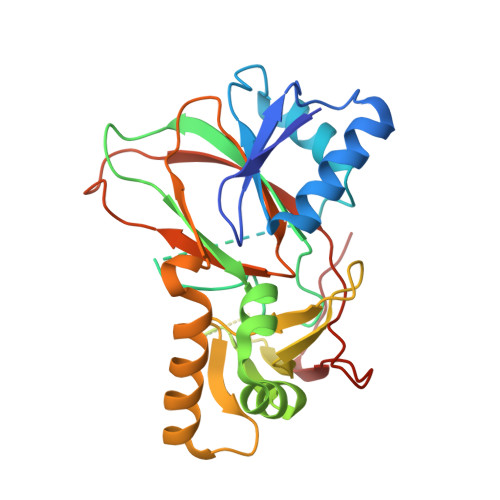Mycobacterium tuberculosis Rv3406 Is a Type II Alkyl Sulfatase Capable of Sulfate Scavenging.
Sogi, K.M., Gartner, Z.J., Breidenbach, M.A., Appel, M.J., Schelle, M.W., Bertozzi, C.R.(2013) PLoS One 8: e65080-e65080
- PubMed: 23762287
- DOI: https://doi.org/10.1371/journal.pone.0065080
- Primary Citation of Related Structures:
4FFA - PubMed Abstract:
The genome of Mycobacterium tuberculosis (Mtb) encodes nine putative sulfatases, none of which have a known function or substrate. Here, we characterize Mtb's single putative type II sulfatase, Rv3406, as a non-heme iron (II) and α-ketoglutarate-dependent dioxygenase that catalyzes the oxidation and subsequent cleavage of alkyl sulfate esters. Rv3406 was identified based on its homology to the alkyl sulfatase AtsK from Pseudomonas putida. Using an in vitro biochemical assay, we confirmed that Rv3406 is a sulfatase with a preference for alkyl sulfate substrates similar to those processed by AtsK. We determined the crystal structure of the apo Rv3406 sulfatase at 2.5 Å. The active site residues of Rv3406 and AtsK are essentially superimposable, suggesting that the two sulfatases share the same catalytic mechanism. Finally, we generated an Rv3406 mutant (Δrv3406) in Mtb to study the sulfatase's role in sulfate scavenging. The Δrv3406 strain did not replicate in minimal media with 2-ethyl hexyl sulfate as the sole sulfur source, in contrast to wild type Mtb or the complemented strain. We conclude that Rv3406 is an iron and α-ketoglutarate-dependent sulfate ester dioxygenase that has unique substrate specificity that is likely distinct from other Mtb sulfatases.
- Department of Chemistry, University of California, Berkeley, California, United States of America.
Organizational Affiliation:

















